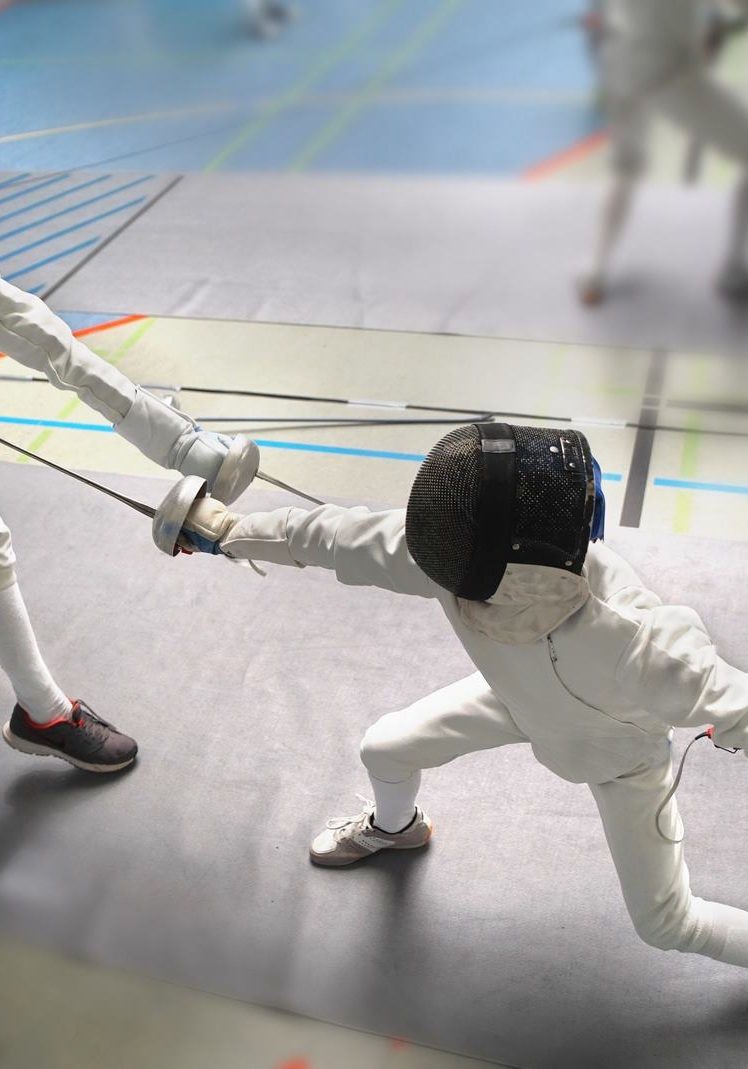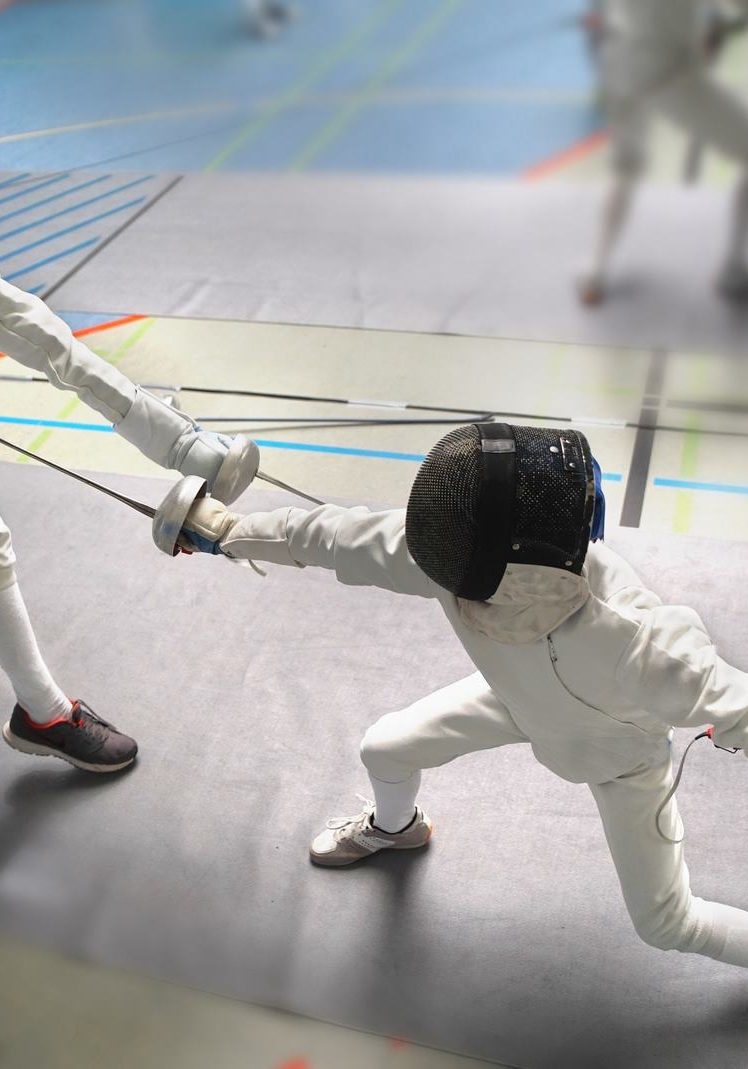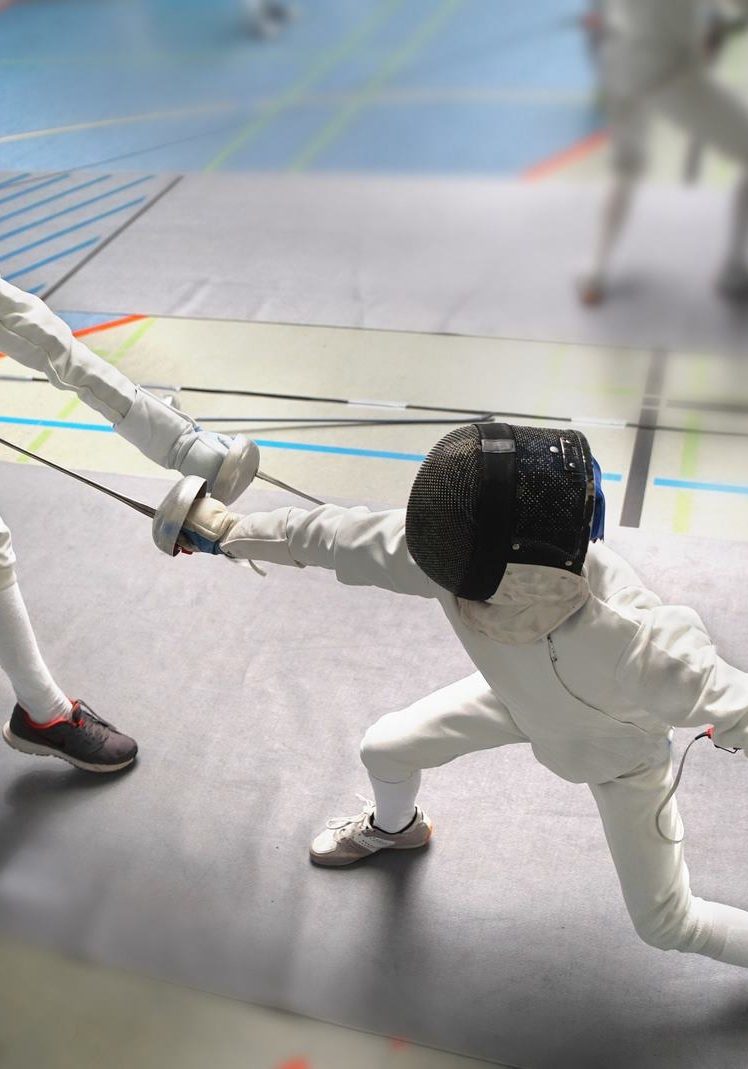Get Fencing
Fencing in Ireland is extremely social, with plenty of Senior and Junior competitions, Inter Varsities, afterschool clubs, Camps or just friendly bouts available throughout the country.
Modern Fencing - The Sport
Fencing has been included in the modern Olympic Games since their inception in 1896. Along with swimming, gymnastics, and athletics, it is one of only four sports to have been contested at every Summer Olympiad.
The 1912 Olympics introduced the Modern Pentathlon, which features a one-hit variant of épée fencing intended to simulate a duel to first blood.
Since then, the sport of fencing has continued to develop, with continual improvements in safety standards, athlete training, and fencing technology. The most notable change over the last century has been the development of electronic scoring, which has allowed for a dramatic increase in the pace of the action, while weapons and protective gear have become lighter and safer.
Modern day fencing has been constantly refined and perfected, with every generation of fencers striving to improve on their forebears.
Fencing Disciplines
Épée
The rapier was developed in Italy during the 16th century, and is still used in the sport today, though now known by a different name – the épée (simply the French word for sword). Its evolution to the modern-day weapon aroses from the adaptations that were required to improve its offensive and defensive capabilities. Originally it was a very light, long blade, which could inflict damage using both the point and edge. It required athleticism and expert technique to be wielded effectively. Of the three weapons used today, the modern épée – in spite of many improvements – remains the closest to its roots.
Foil
The foil was a training weapon for duellists. Training was carried out wearing protective padding and using a walnut on the tip of the blade to prevent injury. In this weapon, the emphasis was put on attacking the vital organ areas, specifically the torso. It gradually developed its own unique rules and style. As duelling became less commonplace, foil took over as a major competitive sport with a distinct difference from épée fencing: “right of way”.
Sabre
The sabre came to the sport from the 18th century Hungarian cavalry, and the modern weapon is descended from the Turkish scimitar. It is a simulation of horseback battle, as the target area for the weapon is above the waist. This allowed combatants to “spare the horse and not the man” at a time when good cavalry horses were difficult to come by, especially on the battlefield. Sabre style is also subject to the “right of way” rule. The play is fast and furious, and like foil, is punctuated by halts from the president.
Frequently Asked Questions
What is fencing?
Fencing is a sport where two competitors at a time use sporting swords (foils, épées or sabres) to score points, typically 5 or 15, within a set time. Fencing is both highly technical and tactical - a dynamic, fun sport that engages people at all stages of life.
Our Sport appeals to a variety of individuals young and old as it provides a different avenue of engagement in sport, to the more common team field sports..
Benefits of fencing
Fencing has a range of unique benefits, especially with regard to mental development as well growing a sense of personal responsibility and independent problem solving skills. Fencing burns off a lot of energy, so an ideal activity to tire out energetic children and ensure that they are enjoying a healthy lifestyle. Good posture, balance and flexibility are key physical attributes that your child will develop while fencing. Other benefits are improved reflexes and coordination all fitness elements that they can bring across to any other sport or activity in their lives.
Do you have to be fit to take part?
You don’t have to be particularly fit to take part. Fencing training will improve your fitness level and stamina as it typically involves general fitness training as well fencing techniques
Is it dangerous?
Fencing accidents are extremely rare and usually associated with faulty equipment. As in most sports, occasional bruises and bumps may happen, but serious accidents are much rarer than in most sports – that said, it is important that the appropriate protective items are used.
Isn’t it a rather elite sport?
Fencing is one of the largest sports in the world in terms of participation. It is the national sport in Hungary and is very popular in France, Germany, Italy and elsewhere in Europe. It is quite strong in North America and just about every country in the world has an active fencing organisation. It is relatively small in Ireland, but Irish fencers are welcome everywhere!
I’m joining a club to see what it’s like. What do I need to bring?
Apart from yourself, wear a tracksuit or similar clothing which allows freedom of movement. After that the club will advise you on what else is needed and will generally have a supply of equipment available until you decide you want to get your own.
So how do I get started
Contact your local club listed under Get fencing or contact Fencing Ireland at secretary@fencingireland.net.
Find a Club
Dublin
Brian Boru Fencing Club
Contact www.brianborufencingclub.ie
Email: dfoley@irishfencing.net
Coach: Tom O’Bren
Modern Pentathlon Fencing Arena, National Sports Campus, Abbotstown, Dublin 15
Monday 7-9pm (adults)
Tuesday 5-6pm (7-11 yrs), 6-7pm (12-16 yrs)
Wednesday 7-9pm (adults)
Thursday 5-6pm (7-11 yrs), 6-7pm (12-16 yrs)
Friday private lessons only
Saturday 10am-12 noon (juniors and adults)
Pembroke Fencing Club
Contact : www.pembrokefencing.ie
Email: info@pembrokefencing.ie
Coach: Olga Velma – 0862160646
St Conleth’s School, Clyde Road, Ballsbridge, Dublin 4
Tuesday 6-7pm (6-12 yrs), 7-8pm (11-13yrs), 8-10pm (junior and adult foil & epee)
Thursday 5.30-6.30 (6-12 yrs), 6.30-7.30 (beginners 15+/adults), 7.30-8.30 (intermediates 15+/adults), 7.30-10pm (adults/advanced épée & foil)
Loreto Abbey, Loreto Avenue, Dalkey, Co. Dublin
Sunday 11am-12pm (6-11 yrs), 12pm-1pm (11-14 yrs), 11am-1pm – junior and adults, foil and epee
Ravenwood Fencing Club
Contact : www.fencefit.ie/
Email: info@fencefit.ie
Coach: Dougal Hazel
John Bosco Youth Centre, Drimnagh
Tuesday 7.30-10pm (Adults)
Sunday 10-11.30am (Youth), 11.30-2pm (Teenagers & Adults)
En Garde Fencing Club
Contact: engardefc17@gmail.com or 0892039210
Coaches: David Losonczi & Piroska Keresztes
Greystones Educate Together NS, Blacklion, Greystones, Co. Wicklow
Monday 17:15-18:45 Roundwood National School
Tuesday 19:15-21:00 Greystones Educate Together School
Wednesday 17:15-19:15 Greystones Educate Together School
Saturday 14:10-16:10 Greystones Educate Together School
Blessington Fencing Club
Contact facebook.com/BlessingtonFencingClub?fref=ts
Contact: leef94@yahoo.ie or at 087 676 4183
Coach Lee Douglas
St Kevin’s Hall, Blessington, Co. Wicklow
Friday 5pm – 9pm
Boyne Valley Fencing Club
Contact boynevalleyfencing@gmail.com
Coaches: John McCabe & Cliona McCabe
Drogheda Grammar School, Mornington Road, Drogheda, Co. Meath
Wednesday
5pm-8.15pm (8-13 yrs),
8pm-9.30pm (13+)
Kingscourt Fencing Club
Email: kingscourtfencing@gmail.com
Coach: Aleh Chakhouski
Phone – 087 167 8787
Munster Blades Fencing Club
Contact www.munsterblades.ie
Email: patrick@munsterblades.ie
Coaches: Patrick Dight
St Mary's Secondary School, Nenagh, Co. Tipperary
Connaught Fencing Club
Contact connaughtfencingclub.blogspot.ie
Email: chiropteryx@gmail.com
Coach: Rainer Bolte
Milltown Community Centre, Tuam, Co. Galway
Wednesday 6-8pm
SMA, Claregalway, Co. Galway
Monday & Friday 7pm-9.30pm
Cork City Fencing Club
Contact -Email: massford@eircom.net
Captain: Tom Brennan
College and Universities
Dublin City University (DCU)
Email: dcufencing@gmail.com
Facebook: facebook.com/DCUFencing/
Captain 2019/2020: Brigita Armonaite
DCU Sports Complex, Glasnevin, Dublin 9
Monday: 8-10pm, Tuesday: 5-7pm, Thursday: 6-7pm
Sunday: 10:30am - 12pm
Trinity College Dublin (DUFC)
Web: trinityfencing.ie
Email: dufencing@gmail.com
Captain Stephen Grogan
Coach: Colm Flynn
Trinity College Sports Centre, Pearse Street, D2
Monday 8-10pm (beginner’s)
Tuesday 8pm-10pm (squad)
Wednesday 7.00am-10am (development) 8pm-10pm (intermediates)
Thursday 7am-10am (squad) 8pm-10pm (development squad)
Friday 4-6pm (beginner’s) 3pm-4pm (fitness)
University College Dublin (UCD)
Web: http://www.ucd.ie/fencing
Email: ucdfencing@gmail.com
Captain 2018-19: Phoebe Ireland
Coaches: Owen McNamee, Tom O’Brien & Andrea Petrignani
UCD Sports Centre, Belfield, D4
Tuesday 17:00-19:00 & 20:00- 22:00 (Intermediate/Advanced)
Thursday 17:00-18:00 & 19:00- 20:00 (Beginners)
Thursday 20:00- 22:00 (Intermediate/Advanced)
Friday 16:00-18:00 (Mixed)
University College Cork (UCC)
Web: http://www.ucc.ie/fencing/
Email: uccfencingclub@gmail.com
Coach: Hugh Tobin
Captain 2018-19: Lillias Healy
Hall 3, Mardyke Arena, Cork
Monday 7pm-8.30pm
Thursday 7pm-8.30pm
Saturday 4pm-7pm
NUI Galway
Web: http://fencing.nuigalway.ie/
Email: fencing@clubs.nuigalway.ie
Captain: Seán Clarke
Coach: Colm Flynn
Kingfisher Club, Galway, Co. Galway
Tuesday 6pm-7.30pm (Beginners)
Thursday 6pm-8pm (Intermediates)
Sunday 2pm-4pm (Intermediates)
Carlow Institute of Technology
Email: carlowit.fc@gmail.com
Coach: John McCabe
Carlow IT Sports Centre, Kilkenny Road, Carlow
Monday 5pm-7pm
Dundalk Institute of Technology (DKIT)
Email: dkitfencing@gmail.com
Coach:
DKIT Sports Centre, Dublin Road, Dundalk, Co. Louth
Friday 7pm-9pm
Maynooth University
Web: http://sports.nuim.ie/clubs/fencing.shtml
Email: fencing@nuimsu.com
Captain: Aleysha O’Connor
Coaches: Chris Mooney & Joana Ramalho
Maynooth University Sports Centre, Maynooth, Co. Kildare
Monday 8pm-10pm
Wednesday 8.30pm-10pm



Parents Corner
Parents Corner
We understand that you need to know more about our sport before allowing your child to participate.
It’s fun!
It inspires the imagination – it isn’t hard to imagine yourself as Luke Skywalker, Darth Vader, or Jack Sparrow.
It’s for everybody
Unlike most other sports, there is no ideal body type for a fencer. How can that be? Winning at fencing is a combination of many things: the mind of a chess player (watching for your opponent’s openings), the face of a poker player (bluffing your opponent), the flexibility of a gymnast (good for lunging), the hand-eye coordination of a calligrapher (Zorro would not be able to Z without it), and the endurance of a marathoner (to win a tournament). No child or adult, for that matter, is going to come into fencing with all of these different attributes.
Respect
Each bout that your child fences starts in the same way: with a respectful salute of the sword to the opponent, to the referee, and to the audience. When fencing without referees, fencers are taught to acknowledge their opponents touches. At the end of the bout, there is a required handshake among opponents. Winning and losing gracefully is not only encouraged, it is expected, along with maintaining respect for the fencers and the referees.
Click here for our https://irishfencing.net/wp-content/uploads/2017/12/Code-of-Conduct-for-Young-Fencers.pdf
Safety
Don’t worry, the swords aren’t sharp. And the kids aren’t really trying to stab each other. Fencers score points and win matches when the blunt tip of their sword merely touches their opponent. They also wear plenty of protective clothing- cool mesh masks and padded white vests that make them look like something out of a Star Wars movie.
Age
The very best age for children to start fencing is somewhere between 7 and 10 years old. However, in a sport that sees athletes win Olympic medals and World Championships into their late thirties, it is possible to reach a very high standard beginning as a teenager or even at college.
And it’s important parents set the right tone: https://irishfencing.net/wp-content/uploads/2017/12/Code-of-Conduct-for-Parents.pdf
Please feel free to contact us or your club with any specific questions you may have
You can read our https://irishfencing.net/wp-content/uploads/2018/05/Child-Safeguarding-Statement-March-2018.pdf
We do have a https://irishfencing.net/wp-content/uploads/2017/12/Child-Protection-Policy.pdf
All involved in coaching, volunteering are subject to our https://irishfencing.net/wp-content/uploads/2017/12/Fencing-Ireland-Vetting-Policy.pdf
Our https://irishfencing.net/wp-content/uploads/2017/12/Code-of-Conduct-for-Coaches.pdf
There is also a policy covering https://irishfencing.net/wp-content/uploads/2017/12/Fencing-Ireland-Photography-Policy.pdf of youth events.
